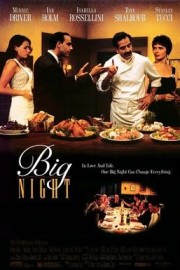Big Night
I remember watching “Big Night” at the Plaza Theatre in Atlanta in their second auditorium, which was up the stairs, and is basically a balcony to the main theatre now. This was the time when I began to watch everything, and Campbell Scott and Stanley Tucci’s film was one of the movies to see if you were a film buff. I really enjoyed it; it didn’t entirely connect with me, but it was a fun watch. Revisiting it 25 years later, I feel now like this is a movie more for older viewers, whom can reflect on how their lives, their pursuits, and their failures, mirror those that Primo and Secondo have in this film. The irony is that for Tucci and Tony Shaloub, whom play the brothers, this was the beginning of new phases of their careers, whereas for their characters, it is an ending. Thankfully, they get to have that one big night that everyone hopes to have where they get to shine. Some people don’t get that opportunity.
The screenplay by Tucci and Joseph Tropiano is beautiful in how it touches on the ideas of immigrants coming to America to pursue the “American Dream,” sibling rivalries, business rivalries, and romantic complications while building up to a big night for Primo and Secondo and their restaurant on the Jersey Shore. Early on in the film, Primo- the chef- has labored all day on a seafood risotto, but that work seems to be lost on the customer who cannot see the seafood; they want a side of spaghetti and meatballs as well. The genius Primo is insulted; Secondo, who’s the front of the house face of the brothers, is trying to make the customer happy. They want their restaurant to stand on the shoulders of an immaculate dining experience, but first, you need to get the customers in, and they are running out of money. A rival Italian restaurant owner (the wonderful Ian Holm) suggests a night with a jazz musician friend of his, Louis Prima. Everything hinges on this night.
As the film progressed, it occurred to me that this has a similar structure as Waiting for Godot, although my point of reference was more “Waiting for Guffman.” The idea of preparing for someone to arrive, and the person never shows up, is a strong shape for a narrative, especially the sort of narrative “Big Night” posits, and the stakes placed on the arrival taking place. This is ultimately about the struggle to accomplish a great passion at life, and how, even when you work hard to pull it off, it’s sometimes just not meant to be. That is heartbreaking when it happens, and you can tell the passion Primo and Secondo are putting in the enterprise. That’s what landed so hard with me this time watching “Big Night,” and Scott and Tucci make that the central theme of the film above anything else, seeing the strain it puts on the brothers, who do not want to see their vision compromised, and feel like they can be successful. This might be as thoughtful and subtle an indictment of the idea of the “American Dream” as anyone has put on film.
I forgot just how stacked this cast is. Tucci and Shaloub- both magnificent- are the main performances we remember, but Ian Holm is a riot as the rival owner, and Isabella Rossellini is aware of what her character’s role is as Holm’s wife, and Tucci’s lover. Minnie Driver plays Secondo’s girlfriend, and seeing the way Secondo is hesitant about their relationship brings tension and a realization that he may be stretching himself too thing, and needs some growing up on his own. Scott shows up as a car salesman, and Allison Janney is a flower shop owner Primo has feelings for. And as Cristiano, the brother’s waiter at the restaurant, Marc Anthony is strong in what he’s given to do.
It’s a bit shocking that I forgot the ending of this movie. The morning after, words have been said, emotions have run high, and all the cards are on the table. The only thing left to do is have some breakfast, and get on with life, whatever that looks like. It’s one of the best single take scenes in movie history, and it says everything we need to know about our main characters. When all is said and done, they know what’s important.










